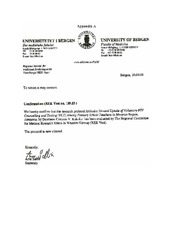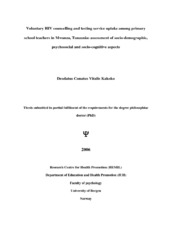| dc.contributor.author | Kakoko, Deodatus Conatus Vitalis | |
| dc.date.accessioned | 2006-10-17T06:31:11Z | |
| dc.date.available | 2006-10-17T06:31:11Z | |
| dc.date.issued | 2006-10-04 | eng |
| dc.identifier.isbn | 82-308-0234-3 | eng |
| dc.identifier.uri | https://hdl.handle.net/1956/1902 | |
| dc.description.abstract | HIV/AIDS presents a major crisis that is increasingly affecting the most productive segments of the population across development sectors in Tanzania. The basic education sector, which is vital to the creation and enhancement of human capital, is equally affected. The loss of skilled and experienced teachers due to HIV/AIDS related deaths and the long-term HIV/AIDS related illnesses are increasingly compromising the provision of quality primary Education in the country. Indeed, this situation demands appropriate intervention measures that will reverse the current trend on the sector of education. Voluntary HIV counselling and testing (VCT) which allows teachers to know their HIV sero-status and prepare for treatment or care may represent a plausible commitment towards HIV/AIDS prevention. There is therefore a need to explore aspects that are important in promoting the uptake of VCT services among primary school teachers in Tanzania. Objectives The focus of this study was to assess the contribution of socio-demographic, psychosocial and social-cognitive factors on the use of VCT services among primary school teachers in Tanzania. The specific objectives were to: 1. find out the prevalence of testing for HIV status as well as socio-demographic and psychosocial correlates of testing for HIV among Tanzanian primary school teachers, 2. assess the prevalence and factors associated with anticipation of HIV/AIDS-related stigma in the utilization of VCT services among Tanzanian primary school teachers, and 3. examine the applicability of the theory of planned behaviour (TPB); and the additional predictive role of perceived risk in predicting use of VCT services among Tanzanian primary school teachers. Methods This cross-sectional questionnaire survey study was conducted between September and November 2003 in Mwanza, Northern Tanzania. The study involved 918 primary school teachers (mean age 38.4; range 21–59 years) from four districts namely Mwanza, Magu, Sengerema and Geita. Fifty-four government-owned primary schools selected from urban, semi-urban, and rural locations participated in the study. All teachers in the selected schools were eligible to participate in the study. The participation rate was 94% (918 out of 977). Descriptive statistics (frequencies, percentages, mean and standard deviation), chi-square test, binary logistic regression and hierarchical regression analyses were carried out using SPSS for windows version 12.0 and 13.0 (paper I-III). Main results Findings of the study were presented in three papers. Paper I, revealed that only 20% (181) of participating teachers had voluntarily tested for HIV. Assessment of the sociodemographic variables showed that teachers who were aged between 21 to 30 years, reported easy access to VCT services, had a partner with college or university education, perceived their health status positively, were more likely to have been voluntarily tested for HIV. Regarding psychosocial aspects, teachers who had not been tested for HIV were significantly more likely to believe that it was not necessary to be tested for HIV in absence of a vaccine or cure for HIV/AIDS, and that only people who suspected that they were infected with HIV should be tested for HIV. They furthermore believed that HIV infected people were likely to die faster if they were tested for HIV and informed of their positive results. Findings in Paper II, indicate that participating teachers anticipated a substantial level of HIV/AIDS related stigma from significant others in their social networks. The anticipated reactions, in their rank order included gossip, blame, fear, avoidance, anger while neglecting was ranked the least. Investigation of the socio-demographic variables showed that teachers in urban areas and those with a Grade A or Diploma level of education were significantly less likely to anticipate reactions of HIV/AIDS-related stigma, whereas teachers who were aged between 51-60 years were most likely to anticipate stigmatizing reactions. Regarding psychosocial factors, teachers who would like to be tested for HIV; who expected less care if they had AIDS; and who had less confidence in relation to the testing for HIV were more likely to anticipate HIV/AIDS-related stigma than others. In paper III, the findings provide support for the applicability of the theory of planned behaviour (TPB) in predicting teachers’ intention to use VCT services. As for the components of the TPB, perceived behavioural control and attitude to the use of VCT emerged as significant predictors of intention to use VCT services. Perceived behavioural control added 12% of variance to intention over and above attitudes and subjective norms, while perceived risk added significantly 3% of variance over and above that of TPB components. Conclusions The present study identifies socio-demographic, psychosocial and social-cognitive factors that are important in promoting VCT service uptake among primary school teachers in Tanzania. The VCT promotion programme for Tanzanian primary school teachers has to focus on enhancing positive perception of VCT and alleviating perceived socialpsychological barriers related to the use of VCT services. More specifically, messages that aim at enhancing the use of VCT services should mainly target augmenting favourable beliefs teachers hold about the consequences of using VCT services as well as alleviating perceived barriers related to the use of VCT services. | en_US |
| dc.description.sponsorship | Norwegian Council of Universities for Development Research and Education (NUFU) through Counselling, Education and Health Promotion (CEHP) | eng |
| dc.format.extent | 260901 bytes | eng |
| dc.format.extent | 106820 bytes | eng |
| dc.format.extent | 108495 bytes | eng |
| dc.format.extent | 126758 bytes | eng |
| dc.format.extent | 792759 bytes | eng |
| dc.format.extent | 645851 bytes | eng |
| dc.format.mimetype | application/pdf | eng |
| dc.format.mimetype | application/pdf | eng |
| dc.format.mimetype | application/pdf | eng |
| dc.format.mimetype | application/pdf | eng |
| dc.format.mimetype | application/pdf | eng |
| dc.format.mimetype | application/pdf | eng |
| dc.language.iso | eng | eng |
| dc.publisher | The University of Bergen | eng |
| dc.relation.haspart | Paper I: Kakoko, D.C.; Lugoe, W.L and Lie, G. T.; Voluntary HIV testing among a sample of Tanzanian teachers: A search for socio-demographic and socio-psychological correlates, (pre-print). Published in AIDS Care, Volume 18, Number 6, 2006, pp. 554 - 560. Copyright Taylor & Francis. <a href"=http://dx.doi.org/10.1080/09540120500259779"target=_blank>http://dx.doi.org/10.1080/09540120500259779</a> | eng |
| dc.relation.haspart | Paper II: Kakoko, D.C.; Lugoe, W.L and Lie, G.T., Prevalence and factors associated with anticipation of HIV/AIDS-related stigma among Tanzanian teachers who have never voluntarily tested for HIV: an exploratory study, (pre-print). Submitted to AIDS and Behavior. | eng |
| dc.relation.haspart | Paper III: Kakoko, D.C.; Åstrøm, A.N.; Lugoe, W.L. and Lie, G.T., Predicting intended use of voluntary HIV counselling and testing services among Tanzanian Teachers using the Theory of Planned Behaviour, (pre-print). Published in Social Science and Medicine, 63:4, 2006, pp. 991-999. <a href"=http://dx.doi.org/10.1016/j.socscimed.2006.02.016"target=_blank>http://dx.doi.org/10.1016/j.socscimed.2006.02.016</a> | eng |
| dc.title | Voluntary HIV counselling and testing service uptake among primary school teachers in Mwanza, Tanzania: assessment of socio-demographic, psychosocial and socio-cognitive aspects | eng |
| dc.type | Doctoral thesis | |
| dc.subject.nsi | VDP::Medisinske Fag: 700::Helsefag: 800 | nob |
| dc.subject.nsi | VDP::Samfunnsvitenskap: 200::Psykologi: 260 | nob |




